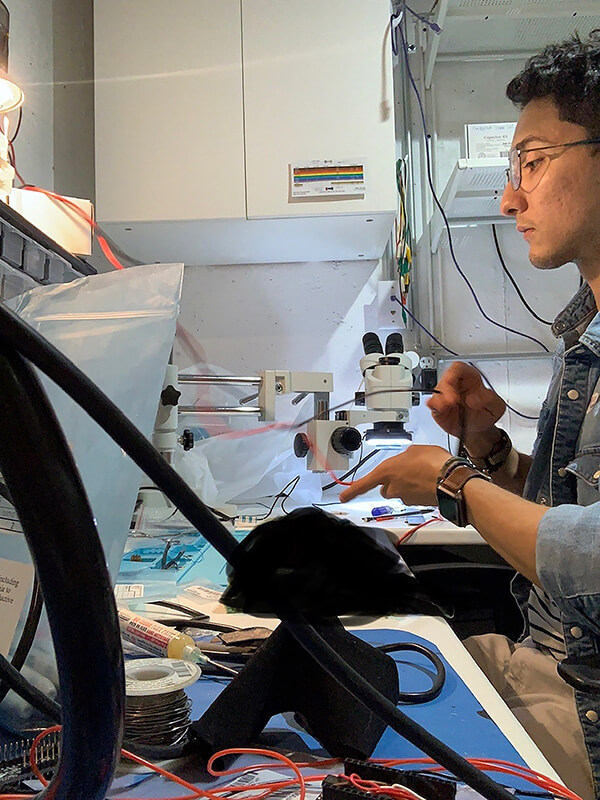November 20, 2018
Purdue student startup developing ‘wearable technology’ wins Southwest Indiana Pitch Competition
 Purdue University student startup Predictive Wear LLC earned $4,000 for capturing first place in the Southwest Indiana Pitch Competition.
Download image
Purdue University student startup Predictive Wear LLC earned $4,000 for capturing first place in the Southwest Indiana Pitch Competition.
Download image
WEST LAFAYETTE, Ind. – Purdue student startup Predictive Wear LLC earned $4,000 for capturing first place in the Southwest Indiana Pitch Competition held in Jasper, Indiana. The new company is developing wearable technology that alerts patients and their doctors about possible medical complications.
The startup was founded by Pablo Argote and Dane Albaugh, who developed the technology before graduating from Purdue’s Weldon School of Biomedical Engineering. They created compression socks with sensors that alert physicians to blood clots in a person’s legs, otherwise known as deep vein thrombosis (DVT). The U.S. Centers for Disease Control and Prevention estimates 300,000 to 900,000 DVT cases annually in the United States, with half those patients developing long-term complications. But DVT is preventable, and Predictive Wear is working on technology to aid in early detection.
“Our ultimate goal is to bring about personalized, predictive medicine through the use of smart garments that can monitor your health,” Albaugh said. “If we were able to achieve this, we could provide predictive health care to the masses, especially underserved areas where patients don’t have regular access to a physician.”
Predictive Wear consists of a team of research engineers who are also from the Weldon School of Biomedical Engineering. Their team includes PhD candidates Orlando Hoilett and Alex Ocken, as well as alumni Alex Masquelin, Sriram Boppana, Michael Drakopoulos and Raj Patel.
The company has completed the prototype and plans to begin their clinical trials in early 2019 to provide a proof of concept for the capability of their device. The company plans to use the money they won in the pitch competition to help pay for the clinical study to help in preparing protocol, getting the necessary approval and manufacturing prototypes.
Another Purdue-affiliated startup, Zoro, took second place in the Nov. 5 competition, earning $2,000. Zoro has devised a debit card that helps build credit.
Purdue-affiliated startup Heliponix, a winner in last year’s competition, also competed in this year’s event. The agricultural engineering firm is developing a dishwasher sized device that provides consumers with an easy way to grow fresh, pesticide-free produce in their homes all year long.
These technologies align with Purdue's Giant Leaps celebration, recognizing the university’s global advancements made in health, longevity and quality of life as part of Purdue’s 150th anniversary. This is one of the four themes of the yearlong celebration’s Ideas Festival, designed to showcase Purdue as an intellectual center solving real-world issues.
Writer: Zeina Kayyali, zmkayyali@prf.org
Purdue Research Foundation contact: Tom Coyne, 765-588-1044, tjcoyne@prf.org
Sources: Dane Albaugh, dane@predictivewear.com
Pablo Argote, pfargo@predictivewear.com

